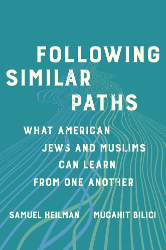These two volumes address the important issue of imbuing meaning in Jewish life. One book deals with those whose observance may be meticulous but mechanical, the other treats the challenge of engaging modern Jews with a sense of Jewishness. The truth is that both books speak to both audiences. Many non-Orthodox Jews observe mitzvot and they too need to endow their performance with more spiritual input. Similarly, Orthodox Jews already committed to a Jewish lifestyle need to understand not only the significance of what they do but how the past influences Jewish destiny. In fact, Rabbi Rothstein spends quite a bit of time exploring the Jewish past.

Nonfiction
We’re Missing The Point:What’s Wrong With The Orthodox Jewish Community And How to Fix it
- Review
By
– June 1, 2012
Rabbi Rothstein is a master teacher who marshals text upon text to build his case and make his point. He sets up his arguments, gives practical examples and demonstrates that the purpose of commandments is to create for humanity a God-consciousness that is constant and immanent. The rituals are the vehicles that create that realization and understanding. His main thesis is not original. There are Talmudic and kabbalistic antecedents. In the thirteenth century the Spanish author of the Sefer haHinukh (Book of Instruction) elaborated on the symbolism and inner meaning of the mitzvot. Rabbi Sampson Rafael Hirsch did the same in the nineteenth century.
While the concept is not new, challenging twenty-first century Jews to rise to this standard is courageous. Being conscious of God every second of every day is not easy. Hasidism recognized this and developed the concept of dveikut (lit. attachment) referring to those unique individuals known as the pious ones (zaddikim) who could sustain this perpetual level of communion with God. However, what Rothstein means is that beyond the rituals, with their deeper meanings to plumb, all Jews should behave as if God is looking over their shoulder when they eat, when they engage in business, when they speak to their friends and their associates, when they pray, when they give charity, when no one is watching how they behave, when they are on vacation, when they speak to their children, spouses, and parents, etc. Rav Soloveitchik called it “God intoxication.” Just going through the motions isn’t enough. In theory he is absolutely correct. Putting it into practice may take some doing.
Shuva offers an attempt to understand the connection between the Jewish people and the Jewish past, the ways in which memory and history relate and compete. How do we relate to Israel, the Holocaust, and to traditional ideas ? As Jews we know in some deep way that our past is essential, but we lack the critical tools necessary to understand our deep relationship to that past without either tearing it down or being obsessed with it.
The loss of a connection to the past has generated confusion, anxiety, and concern among those modern Jews who lack such a connection passed on by memories, yet who still wish to connect Jewishly. Martin Buber recognized this as early as 1929 when he strongly recommended to the Lehrhaus in Berlin to create Jewish memories for a generation bereft of such experiences. However, since religious frameworks do not work for everyone, perhaps we ought to evaluate history instead of memory as the vehicle to relate to the past.
Modern Jews tend to relate to the past through history, which relies on empirical demonstration and rational thought, rather than through memory, which is selective, and constructed. However, replacing memory with history does not build Jewish identity and creates a disconnect between Jews and their collective history. Kurtzer tries to fix this break. Drawing on many classical texts, he shows that “history” and “memory” are not exclusive and that the apparent dissonance between them can be fixed by a selective reclamation of the past and a translation of that past into purposefulness.
Some historians view all of Jewish history as “challenge and response.” The response of modern Jewry to the challenges of dealing with the past may very well dictate the future of those who are not oriented toward commanded-ness. How does our past direct us to live Jewishly in a pluralistic, universalistic society ? What is our relationship to commanded-ness ? How have we in the past and how can we in the future inhabit contradictory realities without needing to suppress one or the other?
The buzzword ‘continuity’ implies passivity and nostalgia instead of a pro-active pursuit of a dynamic relationship to being Jewish. Continuity must have content. There must be some authenticity based on the past or based on some other source of commanded-ness.
Myth and memory are a means of owning history rather than being rebuked by it. Kurtzer offers modern Jews some food for thought in this extended polemical essay. It is not clear if his solution is workable or even acceptable. The first step, as Saadyah Gaon wrote in the tenth century, is to get people to think about it seriously.
Wallace Greene, Ph.D., has held several university appointments, and currently writes and lectures on Jewish and historical subjects.
Discussion Questions

Jewish literature inspires, enriches, and educates the community.
Help support the Jewish Book Council.



